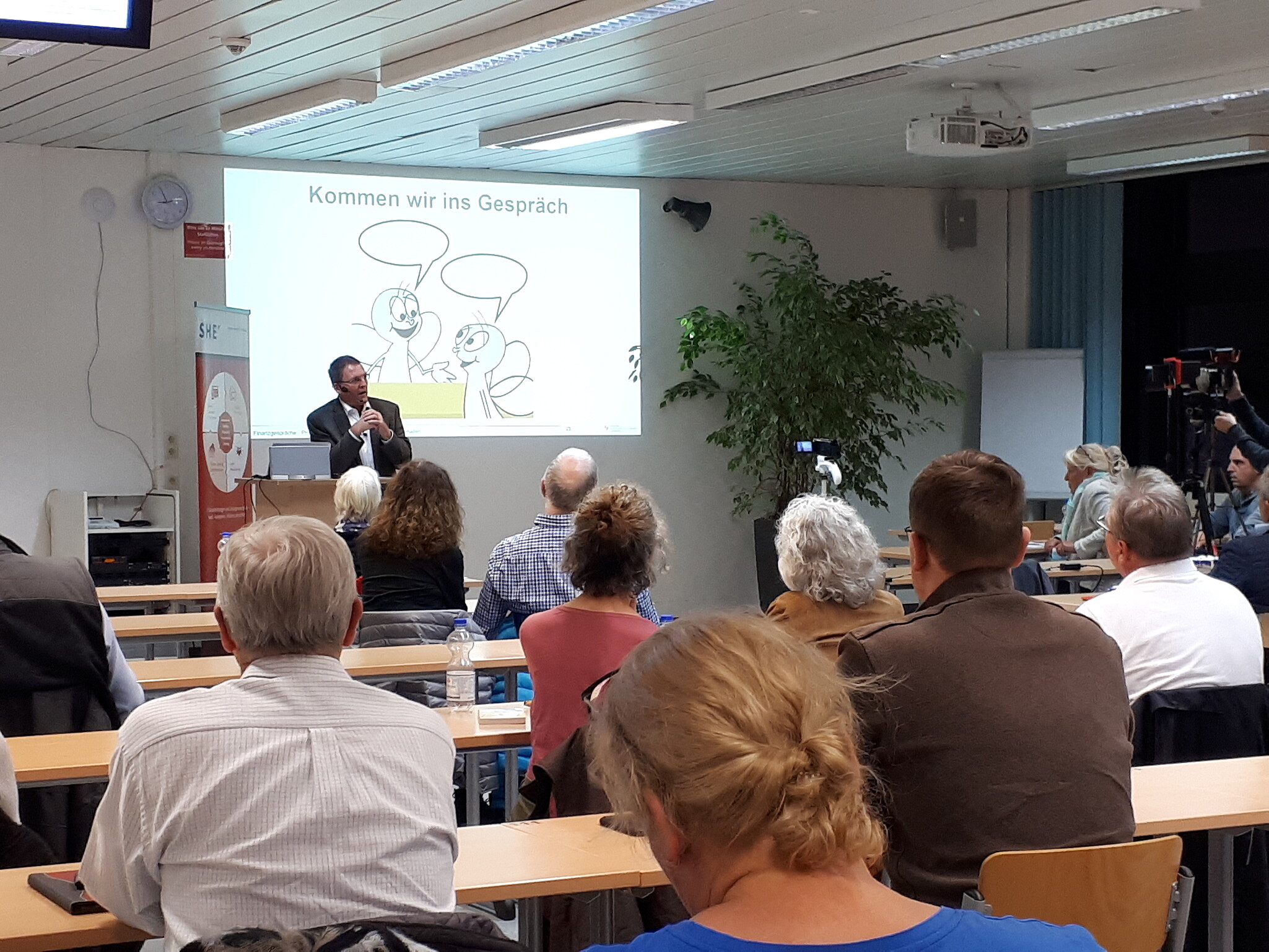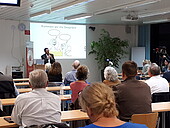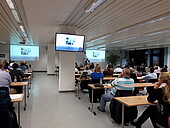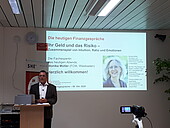An anniversary: The 10th Finance Talks took place on October 08, 2020. And yet nothing was as usual. In Corona times, the Finance Talks moved from the university's auditorium to a large lecture hall where seats could be spread out with wide spacing. This allowed an audience of about 80, only about a quarter of the usual attendance. In addition, the guest speaker Monika Müller from FCM Coaching was connected via video for her parts of the lecture. Finally, the much appreciated get-together and exchange of ideas after the event was omitted. Thus, the 10th Finance Talks were special in many respects. However, the summary is: With commitment and discipline, all participants experienced a knowledgeable, humorous and successful event.
Event initiator Prof. Dr. Hartmut Walz from the Department of Services and Consulting therefore thanked all participants for the good organization and the meanwhile already usual corona-compliant behavior of the participants. And this despite the fact that the experience and perception of risks is demonstrably very subjective.
With it he was also directly in the topic: "Your money and the risk - interaction of intuition, ratio and emotions" - that was the title of these financial discussions. The guest speaker Monika Mueller, Dipl.-Psychologin and foundress of FCM Finanz Coaching in Wiesbaden, pleaded convincingly and supported by various scientific studies for including three things with financial decisions: Ratio, feelings (emotions) and intuition. She is convinced that the ideal financial decision is the deferred intuitive decision. Müller highlighted two key dimensions of how we define, understand and experience financial risk. First, everyone should be clear about whether they perceive risk only unilaterally, as a loss, or bilaterally, as a profit and loss opportunity. On the other hand, it is important whether we see risk as fateful, as "God-given," so to speak, or as something we can shape ourselves. When making decisions between couples, but also in discussions between clients and financial advisors, it is important to make each other aware of their respective definitions of financial risk. Otherwise one talks marvelously at each other past, so confirmed Mueller from their Coaching practice.
Walz added that risk is relative - and offered two further considerations. First, he recommended asking yourself: do I measure loss and gain in nominal terms (money, currency) or real terms (cups of cappuccino, kilos of potatoes)? Secondly: Is my financial risk growing or declining over time? While the price risks of stocks or funds, for example, become more relative as the time horizon grows, the inflation risk and the default risk increase with increasing duration. This also applies to life insurers, said Walz. In this context, he impressively questioned what, for example, nominal premium guarantees for Riester and Rürup contracts are actually worth. Here the customers strive for security, receive however guaranteed the inflation risk and at the same time still the vehicle risk (danger of the insolvency or a difficulty of the insurer) in addition.
In addition, Walz gave the audience the valuable distinction between deep risk and shallow risk, i.e. the distinction between serious, long-term and irreversible risks on the one hand and only temporary and non-existential risks on the other. Walz counted fluctuating stock and currency prices among these superficial risks, which we should not let drive us crazy. What fluctuates lives, and what bends does not break. We should better focus our attention on the five Deep Risks, namely inflation, deflation, destruction, expropriation or insolvency. This is where the real financial and economic dangers lurk.
In the second part of her presentation, Müller addressed financial risk-taking as a personality trait. She cited the universally accepted definition of financial risk-taking as the extent to which a person accepts negative consequences (losses) in order to achieve a positive outcome (gains). Muller emphasized that financial decisions become better when we know our risk tolerance and don't act against it. We feel more comfortable with our financial decisions and we stick with them (e.g., we don't get out immediately in a stock crash) the more they match our own risk tolerance. This is the only way to have a long-term, robust investment strategy.
Without the usual casual pause, it was then straight into the popular Q&A session with the audience. Eloquent, precise and with a twinkle in his eye, Walz responded to the thoughts from the audience. In doing so, he repeatedly referred to Monika Müller in Wiesbaden. In the end, Walz acknowledged the manageable risk that the participants had taken with their presence that evening and wished everyone a healthy time.
The Finance Talks at the Ludwigshafen University of Applied Sciences are an independent neutral information series for the interested public. They take place twice a year under the direction of Professor Dr. Hartmut Walz. Walz teaches business administration at Ludwigshafen University of Applied Sciences; his specialty is the interface between economics and psychology. He is the author of several specialist books, such as "Ihre Finanzen fest im Griff" and "Einfach genial entscheiden im Falle einer Finanzkrise", both published by HAUFE-Verlag. In addition, Walz runs the independent and free Hartmut Walz Finanzblog.
The next finance talks will take place on April 22, 2021 at 7 p.m. in the auditorium of the University of Applied Sciences Ludwigshafen am Rhein as a provocative panel discussion with the title "The bank always wins!(?)". Guest: Dr. Gerhard Schick, founder and executive committee of the citizen movement Finanzwende e.V. Registrations under: Finanzgespraeche@hwg-lu.de.
Picture sources: Prof. Dr. Hartmut Walz © private
Technical contact:
University for economics and society Ludwigshafen at the Rhine
specialist area services and Consulting
Professor Dr. Hartmut Walz
E-Mail: Finanzgespraeche@hwg-lu.de







